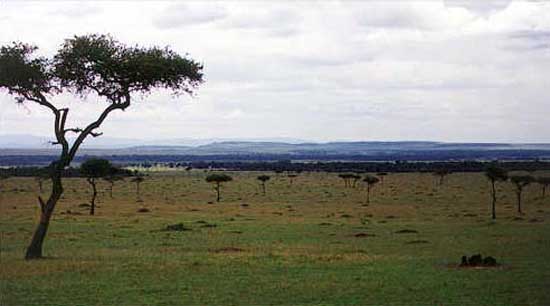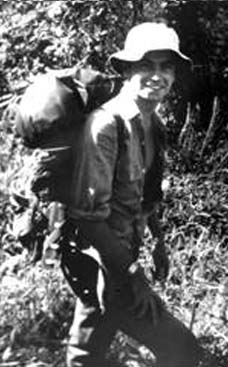
The rest of the world - the Western world, that is - has added to the problem by its new tradition of giving money. For 50 years, since Kenya gained its independence, Western countries and organizations have been handing out money and expecting Kenyans to use it to solve their problems. Instead, Kenya has learned to survive on handouts - from Americans, from Europeans, from well-meaning workers for nongovernmental organizations who live behind barbed wire in fancy houses in Nairobi. And even though we lived in a village with other Kenyans, and rode in their dilapidated buses with their kids and goats and chickens, we were still, to many of them, a source of money. "Promote me" - give me a little something - schoolboys would say to us, even ones who were riding past us on nice bikes and wearing good clothes. But we were there to share our skills. Kenya - Africa - needs modern skills far more than it needs Western cash. The village habit of demanding an unearned share of the wealth hurts everyone, since no one wants to be industrious under such rules, and capital has no chance to be accumulated and invested. Skills, however, can be shared and retained.
Kenya RPCVs Daniel Kohanski and Jean Dahlstrom Marcucci write: Africa needs modern skills and a cultural shift - not cash handouts - to help it flourish
CHANGE FROM WITHIN
Africa needs modern skills and a cultural shift - not cash handouts - to help it flourish
Daniel Kohanski,Jean Dahlstrom Marcucci
Sunday, August 19, 2007
All over sub-Saharan Africa, tribal traditions are the foundation of the society. They give the people a valued sense of place and continuity, the understanding that they are part of an unbroken link between their ancestors and their descendants. They provide a familiar haven from which they can observe the modern world.
But Africa also wants to join the modern world, and trying to do so while keeping one foot planted in the traditional world creates an awkward imbalance for Africans and for Westerners who work with them. In Kenya, where we served as Peace Corps volunteers, we had to learn to work with, not against, many of these traditions. Time, in particular, is still measured according to the needs of traditional agriculture, set to the rhythms of the crops and the seasons, not by the clock. We would call a meeting and people would come - but only after the chores were done, whenever that happened to be.
Some traditions, however, are not just inconvenient, but can be fatal. In many of Kenya's tribes, a widow is expected to marry one of her late husband's relatives. Traditionally, this ensures support for the women and a family tie for her children, but these days she is likely to be an AIDS widow, and if she marries again, the disease could spread even further.
Then there is the traditional belief in witches, which almost cost a man his life in the village we were training in, when a girl accused him of bewitching her into spending her school fees on clothes. Once, we even met an old woman who claimed to be a witch, who terrified her neighbors, and who, so we were told, was seen dancing naked by moonlight over her grandson's grave, seeking power from the newly dead.
"I have 10 children. Give me money," was the first thing she said to us when we came to pay our respects. We were Americans, you see: the rich, the ones who hand out money.
And here is where a new tradition has met with an old one to create a new problem. Traditionally, the family, the village, the tribe, supports its own. If you have food or money or clothing, and your brothers and sisters, your uncles, your neighbors have none, they are entitled to come to you for a share. This works well enough when everyone is close to equal in wealth, but the modern world favors some skills more than others, creating an imbalance within the local society, and far more so when it comes in contact with the rest of the world.
The rest of the world - the Western world, that is - has added to the problem by its new tradition of giving money. For 50 years, since Kenya gained its independence, Western countries and organizations have been handing out money and expecting Kenyans to use it to solve their problems. Instead, Kenya has learned to survive on handouts - from Americans, from Europeans, from well-meaning workers for nongovernmental organizations who live behind barbed wire in fancy houses in Nairobi.
And even though we lived in a village with other Kenyans, and rode in their dilapidated buses with their kids and goats and chickens, we were still, to many of them, a source of money. "Promote me" - give me a little something - schoolboys would say to us, even ones who were riding past us on nice bikes and wearing good clothes.
But we were there to share our skills. Kenya - Africa - needs modern skills far more than it needs Western cash. The village habit of demanding an unearned share of the wealth hurts everyone, since no one wants to be industrious under such rules, and capital has no chance to be accumulated and invested. Skills, however, can be shared and retained.
So we came to the rural highlands of central Kenya to share some of the skills we had learned, both simple and complex. We tried to explain to local groups how a cashbook works, why it is important to keep receipts, and why they need to find products the outside world wants to buy, not just sell the same things back and forth to each other. We also worked for Computers for Schools Kenya, a nonprofit that collects old computers from Europe and the United States, fixes them up, places them in high schools around the country, and then trains teachers how to pass on this most necessary skill to the next generation of Kenyans. If we did not do as well as we had hoped, well, no one ever does. And we introduced ideas to Kenyans for them to think about and act on when they are ready to do so.
Education is the key, and the Kenyans know it. In 2002, the government agreed to provide free primary schooling for all. Secondary schools, however, charge a fee, often beyond the reach of many students, even when the family pulls together to send them. This is indeed one area where Western donations can do the most good, because it gives young people hope.
Hope is something Kenyans are working hard to find. We met a group of coffee farmers whose crops paid less than what it cost to grow them. So they decided to switch to beekeeping, and asked for help in writing a grant proposal. Part of their plan was to include the young people of the area in the venture, because otherwise these young men and women would sit idle, start playing around, and most likely get AIDS. The group's leader did not want to lose this generation. And he wanted to find partners for the job.
We need to see Kenyans, to see all of Africa, as partners on this planet, not as pairs of hands to pick tea, drain trees for rubber, or dig up their lands for gold and uranium. Our planet is too small for that; what they do, or fail to do, affects the rest of us wherever we live. Africa is more than minerals and trees, more than elephants and zebras and cute grass huts. It is people, the ultimate natural resource - people who see the modern world with all its dreams and all its faults, and still they want to be a part of it. But they also want their traditional ways, and are not sure how to reconcile the two.
No outsider can impose a fundamental change on any society. We can give gifts and pay bribes, we can make demands backed by threats and by force of arms, but any changes that result will be temporary, lasting only as long as the money flows or the soldiers stay. The resentment, however, will last much longer. True change happens when the people themselves desire it, when their desire is nurtured by sharing and by suggestion and example, when we help them work out for themselves the solutions that work best for them.
Daniel Kohanski and Jean Dahlstrom Marcucci were Peace Corps volunteers in Kenya, where Kohanski specialized in information technology and Marcucci in small-enterprise development. Contact us at insight@sfchronicle.com.













